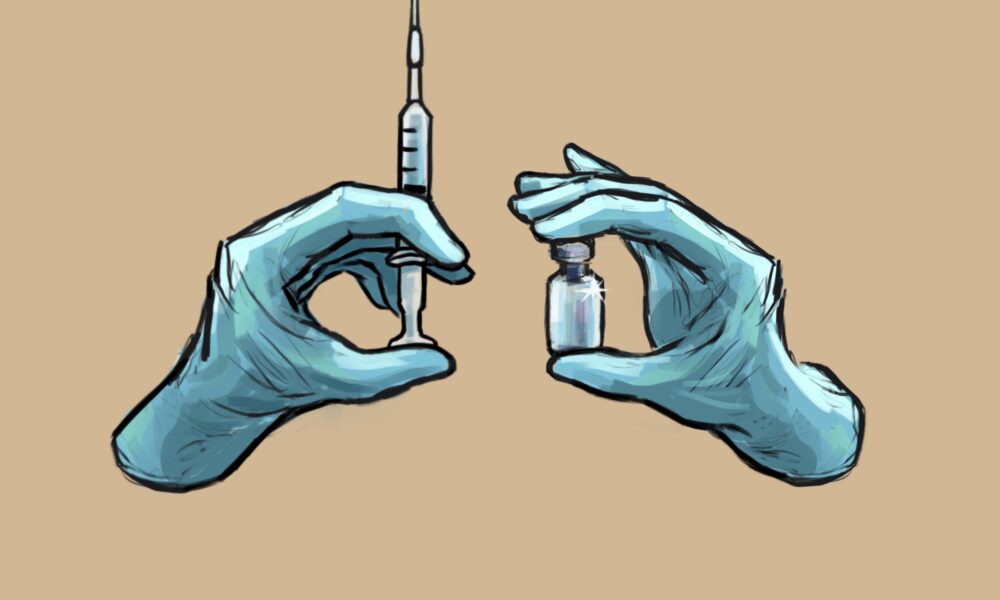In the past few years, we have all become intimately familiar with upper respiratory infections. With the annual cold, flu, and respiratory syntactical virus all on the rise, and the ever-present threat of COVID-19 looming over every crowded room, there is a lot to worry about during the upcoming winter season. Luckily for us, many of these diseases are preventable through widespread vaccination.
Streptococcus pneumoniae, commonly called pneumococcus, is one of these vaccine-preventable diseases. Pneumococcal infections have many presentations—the most common being pneumonia, an infection of the lungs. However, it can also present as meningitis, bronchitis, eye infections, septic arthritis, and other types of infections. While symptoms differ depending on the infected region of the body, pneumococcal pneumonia symptoms include fever, shortness of breath, chest pain, and chills. It spreads through respiratory droplets containing bacteria, direct oral contact with an infected person, or contact with contaminated material.
While pneumococcal infections are most common in children, they are more likely to result in hospitalization and death among adults over 65 and people with chronic medical conditions. While a reliable and effective vaccine against pneumococcus exists, McGill researchers recently published a study in PLOS One that found concerningly low pneumococcal vaccination rates among at-risk populations.
“There is very little discussion about this intervention among the general public and especially among those who are at highest risk,” wrote Dr. Giorgia Sulis, a postdoctoral researcher at McGill who worked on the study, in an email to The McGill Tribune. “Knowing what proportion of high-risk individuals are not getting the vaccine and understanding their characteristics—e.g. where they live, what is their income or education level, what is their health status, etc.—are key steps to take action and improve vaccination coverage rates.”
Dr. Sulis and her colleagues found that 45.8 per cent of participants in the study who were 65 or older and 81.3 per cent of participants aged 47 to 64 with a chronic health condition self-reported that they never got the pneumococcal vaccine, despite being eligible and at high risk of complications if they contracted the disease. Participants from across Canada were sourced through the Canadian Longitudinal Study on Aging. Researchers collected data on the vaccination status of participants via survey. Participants who had gotten a flu shot or who had an appointment with a family doctor in the past year were more likely to have received the vaccine. There was some provincial variation in vaccination rates—Quebec, Alberta, and Manitoba had the highest pneumococcal vaccination rates, while Newfoundland and Labrador, New Brunswick, and Prince Edward Island had the lowest.
The researchers also found that of the participants who received the flu vaccine, 32.6 per cent of those over 65 and 71.1 per cent of those between 47 and 64 years of age with a chronic medical condition did not receive the pneumococcal vaccine. Missed opportunities for vaccination were also seen among participants who had visited a family doctor within a year of the study, with 44.8 per cent of those over 65 and 80.4 per cent of all those with a chronic medical condition missing out on this vaccine.
According to Sulis, who is also a member of the International Tuberculosis Centre, the main barrier to at-risk groups receiving the pneumococcal vaccine is a lack of awareness.
“Past surveys in Canada and elsewhere have shown that one of the main reasons for not getting a pneumococcal vaccine is never having heard of it. I think this speaks to the widespread lack of information about pneumococcal vaccination programs and who is eligible to receive this vaccine,” Sulis wrote.
Other barriers include the cost of the vaccine—not-at-risk people in Quebec must pay $49 to receive it—and limited availability of the vaccine in pharmacies and doctor’s offices. So then, how can vaccination rates be improved?
“It is essential to talk about pneumococcal disease and pneumococcal vaccines so that people learn about this issue and become aware of the benefits of getting vaccinated,” Sulis explained. “Almost everyone has heard about influenza, but very few can say the same about pneumococcus, right?”
In Quebec, the pneumococcal vaccine is free for people over 65 or who have chronic medical conditions. To find out how to receive the vaccine, contact your doctor or pharmacist. Call Info-Santé at 811 to find the closest location with pneumococcal vaccines available.








